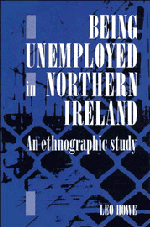Book contents
- Frontmatter
- Contents
- List of tables
- Acknowledgements
- List of abbreviations
- 1 Introduction
- 2 The political economy of Northern Ireland and the anthropology of sectarianism
- 3 Doing the double in Belfast: the general picture
- 4 Doing the double or doing without
- 5 The ‘deserving’ and the ‘undeserving’: administrative practice in a social security office
- 6 Claimants and the claiming process: the reluctant claimant
- 7 Claimants and the claiming process: the assertive claimant
- 8 The employed and the unemployed: conflict, discourse, and ideology
- 9 Conclusion
- Notes
- List of references
- Index
8 - The employed and the unemployed: conflict, discourse, and ideology
Published online by Cambridge University Press: 04 May 2010
- Frontmatter
- Contents
- List of tables
- Acknowledgements
- List of abbreviations
- 1 Introduction
- 2 The political economy of Northern Ireland and the anthropology of sectarianism
- 3 Doing the double in Belfast: the general picture
- 4 Doing the double or doing without
- 5 The ‘deserving’ and the ‘undeserving’: administrative practice in a social security office
- 6 Claimants and the claiming process: the reluctant claimant
- 7 Claimants and the claiming process: the assertive claimant
- 8 The employed and the unemployed: conflict, discourse, and ideology
- 9 Conclusion
- Notes
- List of references
- Index
Summary
Introduction
Under most circumstances, male employment in advanced industrial countries requires little explicit ideological justification. Whilst to many unemployment is a largely unacceptable status, employment is an unquestioned good; it is what everybody does, or should do: ‘the work role tends towards a kind of moral imperative’ (Wadel, 1973: 109; cf. chapter 1). Moreover, being in work signifies more than earning a financial return. A regular job authorizes and influences experience, values, life-styles, consumption patterns, and much else; and such intrinsic functions are largely taken for granted (Jahoda, 1979). Employment also entails a reciprocal relation between society and the individual which legitimates a whole panoply of routine practices. The values which underlie such a valorization of employment are very strongly held and deeply entrenched in the central institutions of the family, education, and the state. In short, the positive value of formal employment is a presupposition from which much else in modern society is derived.
Unemployment entails the loss of many of these benefits just as it reveals their implicit nature. It also destroys much of the basis of a person's relationship to his family, community, and wider society. Consequently, interaction between unemployed and employed people is made difficult and sensitive. The activities and values underpinning employment provide the dominant cultural and ideological framework within which people evaluate, criticize, denounce, or praise the unemployed for the way they speak and act.
- Type
- Chapter
- Information
- Being Unemployed in Northern IrelandAn Ethnographic Study, pp. 185 - 223Publisher: Cambridge University PressPrint publication year: 1990

